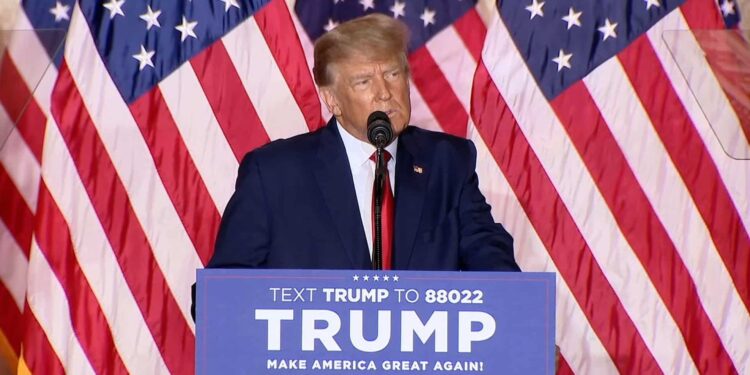Indeed, President Donald Trump’s resurgence in the 2024 election has a special place in U.S. Politics history. Not only does it rank among the most incredible comebacks, but it also validates how complicated American politics are and how redemption stories have the power to change history.
The term Phoenix Presidency appropriately captures President Donald Trump’s journey, marked by a dramatic rise, a significant fall, and a resolute recreation of a political revival. It symbolizes a leader seemingly reborn from his own setbacks.
The path of the American Term for Donald Trump has been through success, hardship, and retrieval, a success like no other. He has been the leader who has experienced severe decline or defeat but aspires to regain power, strengthened by prior experiences.
If we talk about the American president in order, he is elected as the 47th US President.
As the first Republican to win the popular vote in 20 years (George W. Bush was the previous to do so in 2004), Donald Trump’s success as U.S. President-elect in the 2024 election represents a historic accomplishment. With his comeback, Trump will become the oldest U.S. president to be inaugurated at 78, joining Grover Cleveland as one of just two presidents to hold the office for non-consecutive terms.
This victory involved gaining Republican strongholds like Texas and Florida as well as crucial swing states like Georgia, North Carolina, and Pennsylvania, creating a clear route to victory over his opponent, Kamala Harris.
Nonetheless, Different scenes have been sparked by this victory across the nation: as President Donald Trump fans rejoiced in Mar-a-Lago, Harris backers, many of whom were in Washington, D.C., had their hopes sunk when the results showed Trump’s growing lead. Harris’s campaign failed to overtake Trump’s overwhelming advantage for the American Presidency, especially after losing Pennsylvania, a state crucial to her victory plan, despite high Democratic turnout in traditional strongholds.
The Political Journey of President Donald trump
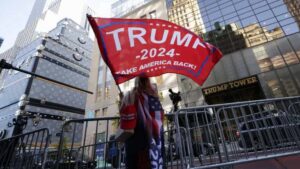
-
The First Ascent to Power
The election of Trump in 2016 was a turning point in U.S. Politics. As a political outsider, he effectively mobilized populist emotion and raised topics that conventional politicians tend to ignore. His rhetoric, ideas, and leadership style challenged conventional wisdom and polarized a large portion of the country while inspiring a loyal following.
Furthermore, as verified in 2016, when Donald Trump was elected president despite losing the national popular vote to Hillary Clinton, the U.S. Electoral College system permits a candidate to win the presidency without winning the popular vote. A candidate must receive 270 of 538 electoral votes to win, and the system distributes electors among states according to population. In U.S. Politics, Even if a candidate loses the popular vote, they can still win the American Presidency by narrowly winning enough states, especially swing states, even if the popular vote represents the total number of votes cast nationwide.
-
The Fall and What Followed
In a severely contested election in 2020, Joe Biden defeated Trump for the president. His career took a significant turn after this loss, which was intensified by the Capitol riot on January 6, charges, and a string of legal issues. Numerous political careers would have probably terminated as a result of the intense criticism and inquiry he received. His influence appeared to be declining for a while in U.S. Politics.
-
The strong comeback
Trump has attempted to re-establish himself on the national scene by running for American Presidency again, challenging political convention. The extent of his appeal among a portion of American voters is confirmed by his continued impact, particularly inside the Republican Party. In an unbelievable turn of events, U.S. President-elect Donald Trump won the popular vote for the first time and now leads Vice President Kamala Harris by almost 5 million votes.
Since he won in 2016 without obtaining a majority of the popular vote, this victory gives his comeback to the White House a fresh meaning. Trump’s 2024 victory in the Electoral College and the popular vote secures his status as a powerful force in modern American politics and as the first Republican to win the popular vote in 20 years.
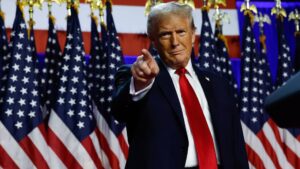
Nonetheless, shedding some light on President Donald Trump’s life, he was born in 1946 into a family with a long history in real estate. His father, Fred Trump, had developed a sizable company in New York. Growing up in a competitive, success-oriented environment, President Donald Trump was the fourth of five children. High-achieving siblings like Robert Trump, who also went into business, and Maryanne Trump Barry, who became a federal judge, were part of his family. The Trump Organization was founded by the family business, which was once known as E Trump & Sons. It also influenced Donald Trump’s business and real estate career.
Furthermore, following his 1968 graduation from the Wharton School of Finance, Trump began working at his father’s real estate company. In the early years of his career, he broadened the company’s focus outside New York residential homes to include prestigious hotels, casinos, and real estate, such as the recognizable Trump Tower. His public perception as a fearless, no-nonsense businessman was solidified by this TV appearance, and it would subsequently become the basis of his 2016 political appeal.
President Donald Trump implemented numerous noteworthy measures during his first term, including significant tax reforms, initiatives to lower medicine prices, military investments, and support for American energy independence. Operation Warp Speed, a landmark program of his administration, aimed to accelerate the development of a COVID-19 vaccine. In terms of international policy, Trump helped to normalize ties between Israel and important Arab countries by facilitating the Abraham Accords. He also met with Kim Jong Un in 2019, making history as the first sitting U.S. President-elect to visit North Korea.
Talking about some hard tides, President Donald Trump has been involved in many scandals during his public life. Outrage was raised by a 2016 audio in which he made offensive remarks about women, which he denied was “locker-room talk.” Further investigation was prompted by his refusal to make his tax returns public and reports that he paid little in federal income tax as a result of significant losses. Trump’s complicated public image is further highlighted by the financial troubles and sexual misconduct accusations that have accompanied him throughout his business and U.S. Politics career.
Furthermore, President Donald Trump is currently dealing with serious legal issues. An unusual felony conviction occurred when he was found guilty in a hush-money case involving adult actor Stormy Daniels. Alleged attempts to tamper with the 2020 election results are the subject of more indictments in Georgia and on federal charges. President Donald Trump is also accused of keeping classified papers after leaving office. Nonetheless, Trump maintains that he is entitled to presidential immunity and continuously rejects any wrongdoing.
Trump is the first American president to have been charged twice. Allegations of urging Ukraine to look into Joe Biden before the 2020 election led to his first accusation in 2019. President Donald Trump was accused of encouraging the January 6 Capitol riot, in which his supporters attempted to overturn the results of the 2020 election, in the second impeachment in 2021. Even though the Senate cleared him in both cases, the public perception of his presidency has been heavily shaped by these charges.
Trump’s political base and enduring impact are embodied by the “Make America Great Again” (MAGA) campaign. His followers see him as a leader who prioritizes working-class concerns and patriotism over establishment politics. This support has been used by Trump’s 2024 campaign, which has further in-built the MAGA philosophy into modern U.S. Politics by framing his prospective return to power as a quest to “restore America’s greatness.”
President Donald trump Election campaigns for 2016 and 2024
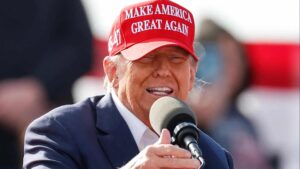
Donald Trump’s American Presidency campaign was in serious decline by the middle of 2016. With his passionate rallies, outsider status, and pledge to “Make America Great Again,” he had already won over a large number of devoted fans during the primaries. But Trump’s direct and occasionally careless approach was starting to turn off other people, even some party members.
Trump’s U.S. Politics campaign suffered a significant setback when he attacked Khizr and Ghazala Khan, the parents of a late American soldier, for speaking out against him during the Democratic National Convention. Rather than expressing admiration or compassion, Trump openly questioned why the soldier’s mother, Ghazala, had remained silent. Many others found his implication that her quiet was because she was Muslim to be disrespectful and inconsiderate.
Both Republicans and Democrats widely criticized this occurrence. Many believed that by focusing on a grieving family, President Donald Trump had gone too far. Leading Republicans started publicly separating from him; some even promised to support Hillary Clinton, his opponent. The scandal continued to dominate the news, and President Donald trump’s poll numbers continued to decline. His chances of winning appeared to be waning for a while, as polls and several analysts predicted that Clinton may win by a landslide.
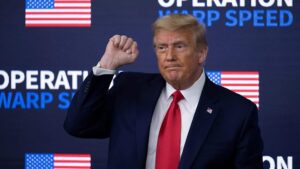
Additionally, Trump’s American Presidency campaign crew was in confusion throughout this time. His campaign chairman, Paul Manafort, attempted to encourage Trump to remain on course and behave more “presidentially.” However, the American Presidency refused to be controlled. He consistently disregarded Manafort’s counsel, making audacious and occasionally provocative remarks that further damaged his campaign.
Manafort himself eventually turned into a burden. Concerns over foreign involvement in the campaign were raised when it was revealed that he may have received millions of dollars in payments from pro-Russian political organizations in Ukraine. After Trump made the decision to fire Manafort, he appointed Steve Bannon as campaign CEO and Kellyanne Conway as campaign manager. Both would be essential to Trump’s campaign’s recovery.
Hillary Clinton’s team took a “hands-off” stance toward Trump’s controversies while his American Presidency campaign appeared to be failing, allowing his own words and deeds to damage his reputation. Clinton’s advisors thought that if Trump was allowed to continue, he would “dig his own grave.” Instead of going straight after Trump, Clinton turned her attention to raising money and meeting with supporters to expand her American Presidency campaign resources.
Clinton criticized President Donald trump’s business practices using her platform, pointing out that he frequently outsourced jobs abroad while saying he supported American workers. By making an effort to win over women, minorities, and other groups that were intimidated by Trump’s remarks, she pursued to broaden her support.
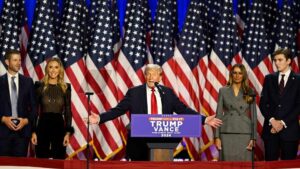
By August, President Donald Trump was still trailing in the polls and facing pressure to boost his reputation. Astute political pollster Kellyanne Conway intervened to direct Trump’s rhetoric. She urged him to decrease his criticism of organizations other than Clinton, stay on topic, and refrain from making the off-script remarks that had been bothering him. She promoted speeches for the American Presidency campaign that were more planned and frequently read from a teleprompter, which made it harder for Trump to change direction course. Trump also started taking strategic actions to improve his reputation.
He even expressed “regret” in one address for some of his American Presidency campaign-related remarks, although he did not name them. Trump has seldom ever acknowledged his mistakes during his campaign, so this was a big change.
Although the apology was unclear, it was an effort to comfort voters who might have been cautious of him because they thought he was too unthinking or aggressive to be the nation and U.S. Politics leader.
Nonetheless, His public image appeared to stabilize as a result of Conway’s influence, which also enabled him to shift his message to one that was more positive and less direct. When President Donald Trump visited Louisiana following a significant flood, he adopted a more “presidential” tone while distributing help to those in need. In an attempt to prove his ability to manage foreign ties, he even traveled to Mexico to speak with President Enrique Peña Nieto.
Clinton dealt with her own issues while Trump tried to mend his reputation. A persistent problem during her tenure as Secretary of State was her use of a private email server. The impression that Clinton was unreliable was strengthened by fresh information from the FBI probe that implied she and her staff had handled sensitive material carelessly.
President Donald trump’s supporters gathered behind the notion that Clinton was dishonest and beyond the law, and these email-related scandals provided his team with more evidence against her. As the media and Trump’s American Presidency campaign continued to focus on Clinton’s emails, some voters who were still on the fence started to wonder if she was a reliable substitute for Trump.
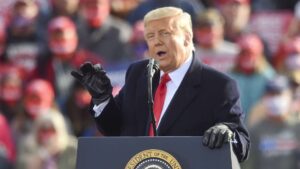
Trump’s position in the polls strengthened as the campaign moved into the fall. Trump’s factual attitude continues to draw in those who were fed up with “politics as usual” despite the scandals. These people, many of whom were fed up with career politicians, viewed Trump as a “truth-teller” who dared to question the existing state of affairs.
In the end, President Donald Trump’s rise and decline in the 2016 election validated that, despite criticism and disappointments, he managed to slightly alter his American Presidency campaign to stay competitive. One of the most surprising comebacks in contemporary political history was made possible by his outsider appeal as well as Clinton’s personal scandals.
Trump’s American Presidency campaign adjusted and gained momentum despite all the drama and political blunders, demonstrating that an unorthodox strategy might succeed during a period of general dissatisfaction with the political system.
Furthermore, for the 2024 American Presidency campaign, Appealing to popular dissatisfaction with the Biden administration, particularly on problems like immigration, crime, and inflation, helped Donald Trump win the presidency in 2024. His triumph was distinguished by a virtually uniform surge in support throughout urban, suburban, and rural areas, reflecting a general displeasure with current leadership rather than specific GOP campaign methods.
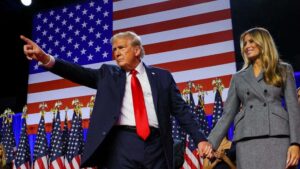
Even in Sun Belt cities with high economic production, such as Phoenix and Tampa, Trump gained ground, signaling a change in historically Democratic urban areas. While many supporters prioritized economic issues, they were doubtful of President Donald trump’s programs and attitude.
According to analysts, President Donald Trump consistent increases are a response to Biden’s alleged insufficiencies, and Democrats may bounce back if Trump falls short on important presidential promises. But there are risks to his plan, particularly if his civil rights, tariffs, and deportation policies lead to further social or economic problems. President Donald trump’s success for the time being depends on resolving pressing issues, but he will require outcomes to maintain support in 2026 and 2028.


